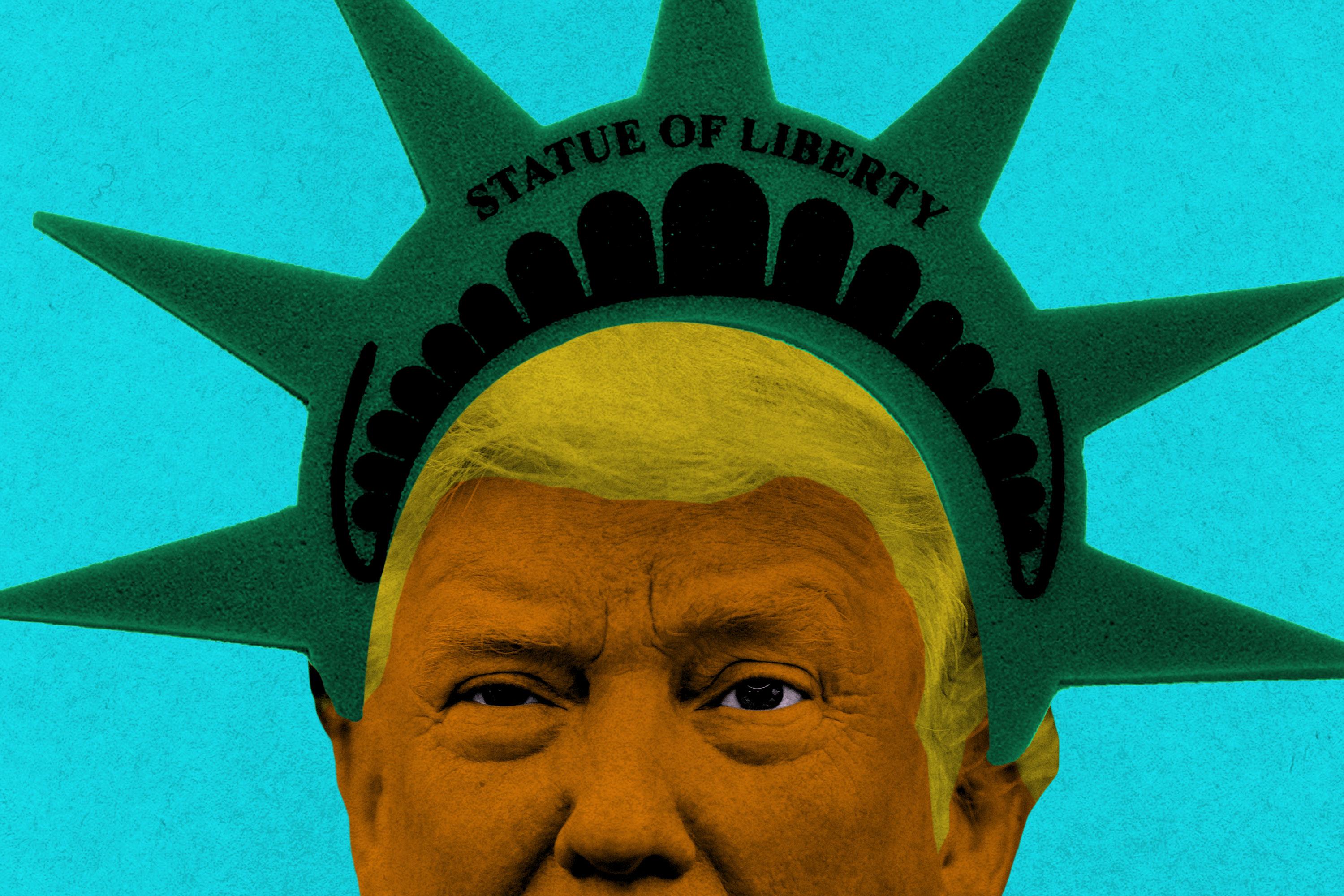
For President Donald Trump, only certain national tragedies present urgent political concerns. If the tragedy in question doesn’t serve as an ideological coup for the president, Trump won't address the issues it raises with clarity or speed. Charlottesville wasn’t a political crisis, nor was the October 1 massacre in Las Vegas. But, in Trump’s estimation, this week’s terror attack in Lower Manhattan is cause for Congress to act—not against neo-Nazi activists or on gun control, but on immigration reform.
On Tuesday afternoon, an Uber driver sped a truck down a crowded bike lane in Lower Manhattan, leaving eight pedestrians dead and 12 others injured. The NYPD shot and arrested the driver, Sayfullo Saipov, at the scene. Stridently anti-immigrant, Trump quickly found an ideal bogeyman in Saipov, as an early report from ABC News revealed that the 29-year-old Uzbek immigrant first entered the country in 2010 through the federal Diversity Immigration Visa Program, established by the Immigration Act of 1990 and born of congressional efforts to curb overrepresentation of European immigrants. (Uzbekistan is part of Central Asia.) According to ABC News, Saipov moved around Ohio, Florida, and New Jersey before turning up this week in New York, where he carried out the deadliest attack on the city since 9/11. Saipov, who is currently hospitalized at Bellevue Hospital Center, faces federal terrorism charges.
In the first hours after the attack, Trump tweeted his condolences to victims’ families, but not before taunting ISIS. Noting Saipov’s allegiance to the Islamic State, Trump seized the opportunity to reset the debate over his immigration agenda. “I have just ordered Homeland Security to step up our already Extreme Vetting Program,” Trump announced, immediately revealing the most coherent political coordination that the White House has demonstrated all year. “The terrorist came into our country through what is called the ‘Diversity Visa Lottery Program,’ a Chuck Schumer beauty,” Trump added. On Wednesday afternoon, Trump announced at a Cabinet meeting that he would ask Congress to end the visa lottery program that welcomed Saipov to the U.S., a program which Schumer helped draft in 1990 when he served in the House. On Twitter, Schumer responded sarcastically to Trump: “I guess it’s not too soon to politicize a tragedy.”
Schumer was referring to how Trump and the GOP leadership were unwilling to consider major gun control reforms immediately following the Las Vegas massacre, which left 59 people dead and more than 500 injured just last month. In the first briefing after one of the deadliest mass shootings in American history, White House press secretary Sarah Sanders suggested that a “day of mourning” was an inappropriate time for political leaders to discuss any urgent political redress. “There will certainly be a time for that policy discussion to take place, but that’s not the place that we’re in at this moment,” Sanders told reporters. With Saipov, Trump and his White House have demonstrated no such restraint. Rather, Saipov’s been presented as the archetypal failure of U.S. immigration policy, which Trump has attempted to overhaul with a travel ban (that doesn’t cover immigration from Uzbekistan), the rollback of DACA protection for children of U.S. immigrants, and more aggressive federal detention efforts (while ICE arrests are up 43 percent compared with last year, deportations have slowed compared with 2016) nationwide.
Of course, one key difference between Saipov and Las Vegas shooter Stephen Paddock is that Saipov’s massacre neatly—and fearsomely—illustrates Trump’s political interests. In June 2015, Trump descended the escalator at Trump Tower to announce his presidential bid and opened by ranting about a fantastical wave of violent crimes—drug trafficking and rape—which he attributed to an unregulated influx of Mexican immigrants. Since the formal start of his political career, Trump has argued that lower-class immigrants sow violence and sloth, and create hardship for white American workers who feel they struggle to compete with many immigrant groups for jobs. Though not from any of the predominantly Muslim countries that Trump has targeted with his travel ban, Saipov embodies the Trumpian fever dream in which “hard-working” immigrants with strange backgrounds and dark complexions are leechers and, quite possibly, terrorists. Reports that Saipov yelled “Allahu Akbar” after he got out of the truck have prompted waves of specifically anti-Muslim sentiment that emboldens Trump and large factions of his base. And the fact Saipov used a truck has relieved Trump of any pressure to discuss gun control, a public safety conversation that other recent killings have invited.
It is entirely possible that Trump’s political fearmongering about immigrants will falter in practice. Few of Trump’s priorities have achieved real traction on Capitol Hill, and the president’s extremist anti-immigration agenda in particular has been a fit of false starts and ambiguous execution. For once, Paul Ryan’s refusal to entertain discussion on anything other than tax reform might offer some solace to the president’s critics, who would loathe to see Trump advance his anti-immigrant agenda now after a year of embarrassing legal setbacks for his travel ban. But even if the president fails to ever build the wall or close the borders to whichever countries he deems broadly suspicious, Trump will relish this chance to rehash the fears that got him elected. In days of mourning, Trump will have no trouble casting Saipov as the most urgent concern of his political movement and his presidency.

